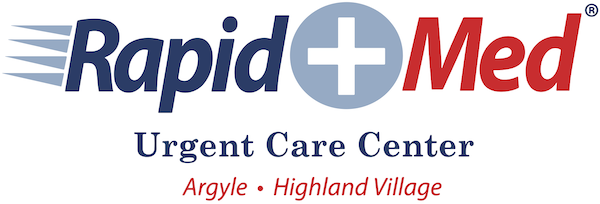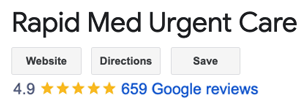Assessment, Treatment, and Seeking Care at Rapid Med Urgent Care
May is recognized as Allergy and Asthma Awareness Month, shedding light on these prevalent conditions that affect millions of individuals worldwide. Allergies and asthma can significantly impact daily life, causing symptoms ranging from mild discomfort to severe respiratory distress. At Rapid Med Urgent Care in Highland Village or Argyle, we understand the importance of effective assessment and treatment for allergies and asthma, offering comprehensive care to patients experiencing ongoing or worsening symptoms.
Assessment of Allergies: Allergies commonly occur when the human immune system potentially overreacts to harmless floating substances known as allergens, triggering a range of symptoms. Common allergens typically include pollen, dust mites, pet dander, mold, and certain foods.
Assessment of allergies typically involves:
- Medical History: A thorough review of the patient’s medical history, including symptoms, triggers, and previous allergic reactions, helps identify potential allergens and guide diagnostic testing.
- Allergy Testing: Allergy testing may include skin prick tests, blood tests (such as IgE antibody tests), or patch tests to identify specific allergens triggering allergic reactions.
- Symptom Evaluation: Assessing allergy symptoms such as sneezing, nasal congestion, itching, watery eyes, coughing, wheezing, skin rashes, or gastrointestinal symptoms helps determine the severity and impact of allergies on daily life.
- Environmental Assessment: Identifying and minimizing exposure to allergens in the patient’s environment, such as implementing dust mite covers, using air purifiers, or avoiding pollen exposure during peak seasons, may help reduce allergic symptoms.
- Treatment of Allergies: Treatment for allergies aims to alleviate symptoms, minimize exposure to allergens, and manage underlying inflammation.
Options for allergy treatment may include:
- Medications: Antihistamines, decongestants, nasal corticosteroids, and other allergy medications can help relieve symptoms such as nasal congestion, itching, sneezing, and watery eyes.
- Allergen Immunotherapy: Allergy shots or sublingual immunotherapy (allergy drops) may be recommended for individuals with severe or persistent allergies to desensitize the immune system and reduce allergic reactions over time.
- Avoidance Measures: Avoiding exposure to known allergens through environmental modifications, such as using allergen-proof bedding, keeping pets out of the bedroom, and closing windows during high pollen seasons, can help minimize allergic symptoms.
Asthma Assessment: Asthma is a chronic respiratory condition characterized by typical inflammation and the narrowing of an essential airway, potentially leading to such symptoms, such as wheezing, uncontrolled coughing, intense chest tightness, and a shortness of deep breaths.
Assessment of asthma typically involves:
- Medical History: A detailed review of the patient’s medical history, including symptoms, triggers, previous asthma attacks, and family history of asthma or allergies, helps assess the severity and control of asthma.
- Lung Function Tests: Spirometry, a lung function test, measures the amount and speed of air expelled from the lungs, helping diagnose and monitor asthma severity and response to treatment.
- Symptom Evaluation: Assessing asthma symptoms such as wheezing, coughing, chest tightness, and shortness of breath helps determine the frequency, severity, and impact of asthma on daily activities.
- Triggers Identification: Identifying and avoiding triggers such as allergens, air pollution, respiratory infections, smoke, exercise, or stress can help prevent asthma exacerbations and improve asthma control.

Treatment of Asthma: Treatment for asthma aims to control symptoms, prevent exacerbations, and improve lung function.
Options for asthma treatment may include:
- Controller Medications: Inhaled corticosteroids, a long-acting true beta-agonists, and leukotriene modifiers, other controller medications help reduce airway inflammation, prevent asthma symptoms, and improve lung function over time.
- Rescue Medications: Short-acting beta-agonists (quick-relief inhalers) provide rapid relief of asthma symptoms during acute exacerbations or asthma attacks.
- Allergy Management: Managing underlying allergies through allergy medications, immunotherapy, and allergen avoidance measures can help reduce asthma symptoms triggered by allergic reactions.
- Asthma Action Plan: Developing a personalized asthma action plan in collaboration with a healthcare provider helps patients recognize early warning signs of asthma exacerbations, adjust medication dosages, and know when to seek medical attention.
Seeking Care at Rapid Med Urgent Care: If you or a loved one experiences ongoing or worsening symptoms of allergies or asthma, it’s essential to seek prompt medical attention to prevent complications and ensure effective management.
Rapid Med Urgent Care in Highland Village or Argyle offers comprehensive care for allergies and asthma, including:
- Expert Evaluation: Our experienced healthcare providers conduct thorough assessments, including medical history review, symptom evaluation, allergy testing, lung function tests, and diagnostic imaging as needed, to accurately diagnose and manage allergies and asthma.
- Personalized Treatment: We develop individualized treatment plans tailored to each patient’s needs, preferences, and lifestyle, focusing on symptom relief, allergen avoidance, medication management, and long-term asthma control.
- Allergy and Asthma Specialists: Our team includes allergy and asthma specialists with extensive training and expertise in diagnosing and managing allergic conditions and respiratory disorders, ensuring patients receive specialized care and support.
- Ongoing Monitoring: We provide ongoing monitoring and follow-up care for patients with allergies and asthma, tracking symptoms, adjusting treatment regimens, and optimizing asthma control to promote optimal health and well-being.
- Education and Support: We offer education and support to patients and their families, empowering them to understand their condition, recognize triggers, manage symptoms, and navigate the complexities of allergy and asthma management effectively.
By seeking care at Rapid Med Urgent Care in Highland Village or Argyle, individuals experiencing allergies or asthma can receive timely evaluation, personalized treatment, and ongoing support to achieve optimal symptom control and improve their quality of life. Don’t let allergies or asthma limit your activities – visit Rapid Med Urgent Care for expert care and relief from allergy and asthma symptoms today.

